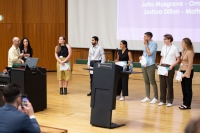Each year, the institute opens several calls to reward the outstanding research efforts of its student members, with the goal of helping them advance their academic careers and gain recognition in the field of in silico medicine.

At the 2024 Virtual Physiological Human Conference in Stuttgart, the VPH Institute proudly recognized the exceptional work of its student members through a series of prestigious awards. Each year, the institute opens several calls to reward the outstanding research efforts of its student members, with the goal of helping them advance their academic careers and gain recognition in the field of in silico medicine.
During this year’s conference, three key awards were presented. The 2024 Best Thesis Award honored the most impressive PhD thesis in the field written in 2023, while the Best Student Award—a biannual honor in occasion of the Conference—highlighted excellence among VPHi student members presenting their work. These two awards went to Sara Bridio from Polimi and Finneas Catling from Imperial College London, respectively.
In addition to these, the Best Poster Award was granted to Atefeh Rahimi from the University of Auckland. Her innovative research on "Utilising self-similarity to model the morphometry of the pulmonary arteries" was evaluated by a panel of experts across different areas of in silico medicine. Her work scored highest based on the Originality of the research, the Quality of the methodology, the Potential impact of the results, and the overall Clarity of her presentation.
This year also marked a first for the VPHi Institute: the introduction of six travel awards to support student members with travel, accommodation, and living expenses during the conference. This initiative reflects the Institute’s ongoing commitment to fostering accessibility and participation among young researchers in the community. The awards have been granted to Priya Jayadev Nair, Davide Ninarello, Julia Musgrave, Omkar Athavale, Joshua Dillon and Mathilde Verlyck.
All awards were presented during the closing ceremony on September 6, 2024, as we celebrated the next generation of researchers driving forward the future of in silico medicine.